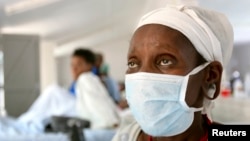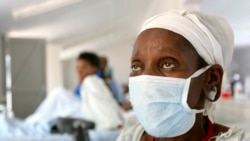In our increasingly interconnected world, it is no longer possible for one country or continent to isolate itself from events and problems occurring elsewhere. Clearly, health issues plaguing one region, be they endemic problems or newly emerging diseases, can spread to become a health issue everywhere. So, those governments that wish to safeguard the health of their own citizens must begin by helping to protect the health of people living continents away. And we will only be successful if we work together.
Thus, in 2009, President Barack Obama unveiled one of the signature programs of his administration -- the Global Health Initiative, by which, as former Secretary of State Hillary Clinton said at the time, “the United States hopes to save the greatest possible number of lives, both by increasing existing U.S-backed health programs and by building upon them to help countries develop their own capacity to improve the health of their own people.”
Africa, especially sub-Saharan Africa, has been one of the beneficiaries of United States investment in global health. Speaking at the Africa Health forum in late April, Deputy Secretary of State William Burns noted that the African continent has undergone a dramatic transformation, “from a region once defined largely by its problems. . . . to a region known more and more for its economic growth, expanding democratic governance, and enhanced health and human development.”
And as governments take on greater leadership and responsibility for their own future, the nature of assistance and cooperation from the international community should evolve as well – from a donor-recipient relationship to country ownership, shared responsibility, and mutual respect.
This means that governments – in partnership with civil society and the private sector – should lead, implement, and eventually pay for all aspects of their health system.
“None of us are under any illusion that these transitions are easy or risk-free. But you have shown that they are possible,” said Deputy Secretary Burns. “The only way we can eradicate polio, reach the goal of an AIDS-free generation, eliminate the effects of neglected tropical diseases, roll back malaria, and end preventable maternal and child deaths, is if we do it together.”
Thus, in 2009, President Barack Obama unveiled one of the signature programs of his administration -- the Global Health Initiative, by which, as former Secretary of State Hillary Clinton said at the time, “the United States hopes to save the greatest possible number of lives, both by increasing existing U.S-backed health programs and by building upon them to help countries develop their own capacity to improve the health of their own people.”
Africa, especially sub-Saharan Africa, has been one of the beneficiaries of United States investment in global health. Speaking at the Africa Health forum in late April, Deputy Secretary of State William Burns noted that the African continent has undergone a dramatic transformation, “from a region once defined largely by its problems. . . . to a region known more and more for its economic growth, expanding democratic governance, and enhanced health and human development.”
And as governments take on greater leadership and responsibility for their own future, the nature of assistance and cooperation from the international community should evolve as well – from a donor-recipient relationship to country ownership, shared responsibility, and mutual respect.
This means that governments – in partnership with civil society and the private sector – should lead, implement, and eventually pay for all aspects of their health system.
“None of us are under any illusion that these transitions are easy or risk-free. But you have shown that they are possible,” said Deputy Secretary Burns. “The only way we can eradicate polio, reach the goal of an AIDS-free generation, eliminate the effects of neglected tropical diseases, roll back malaria, and end preventable maternal and child deaths, is if we do it together.”






